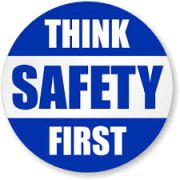 Fencing is a very safe and lifelong sport. Fencing is often said to be safer than golf. Whether or not this is true, it is an extraordinarily safe sport considering its heritage and nature. The following common-sense safety rules and guidelines help make this sport one of the safest and most enjoyable experiences.
Fencing is a very safe and lifelong sport. Fencing is often said to be safer than golf. Whether or not this is true, it is an extraordinarily safe sport considering its heritage and nature. The following common-sense safety rules and guidelines help make this sport one of the safest and most enjoyable experiences.
Safety Rules
- Mask, jacket, long pants, and glove must always be worn when fencing.
- The weapons are to be treated with respect and awareness at all times. Weapons must be carried point down at all times. They are not toys. A weapon is only pointed at another person when that person is fully masked and ready to fence or drill.
- Fencers must always be masked when weapons are raised, point forward. This means on all occasions, including discussion of actions and during drills.
- Violent fencing actions are not permitted. Fencers must control parries and attacks so that the opponent is not injured by whipping or hard stabbing actions of the blade. If you cannot execute a flick properly, don’t do it. Do not cause body contact nor use the unarmed hand against your opponent. Do not turn your back on your opponent.
- Stop fencing instantly if you think something is wrong or if your opponent retreats and waves the unarmed hand or gives any sign of wanting to stop.
- If you think a weapon is broken, stop fencing instantly.
- If you counterattack, you are responsible for preventing body contact, injury, and weapons breakage.
- If you feel a fencer is behaving in a dangerous or uncontrolled fashion, report it to an instructor immediately. They will speak to the fencer without disclosing your identity.
- Inspect your weapons and mask each time you use them. If you are using borrowed gear and find any problem please report it to an instructor. Do not put the item in question back into club storage without reporting it.
- Wear proper shoes for fencing (court, cross-training or fencing shoes). Please be sure that shoes are clean when entering the fencing floor to avoid dust and moisture buildup which make the floor slippery.
- Fencers on the floor have right of way. Persons not fencing are obligated to keep themselves and their gear clear of fencers on the floor.
- Report injuries immediately to an instructor.
Guidelines for Clubs & Classes
The goal is to teach the art and science of fencing in a safe environment of mutual respect and self discipline. Just as in a martial arts dojo, the traditions governing behavior in a fencing club have developed over the centuries. These traditions promote respect for one’s self, one’s opponent, the instructors, the weapons, and the tradition itself, as well as promoting safety. Repeated or egregious violations of protocols safety or sportsmanship will not be tolerated. Violators may be removed from class at the coaches’ discretion.
- It is expected that each student enter and exit the venue respectfully. The instructors are to be addressed as Coach by the students. Students will respond to a coach’s request promptly and respectfully.
- Each fencer will salute his drill partner before and after every encounter. Each fencer will salute his opponent, the referee, and his/her clubmates before every bout, and salute his/her opponent and shake hands after every bout.
- When we are playing games or having team contests, cheering for your team is encouraged, but name calling and displays of poor sportsmanship will not be tolerated.
- Food and beverages are never allowed on the fencing floor. Students are expected to clean up after themselves on the fencing floor, outside the fencing area, and while visiting other teams or clubs. In a club, each student is responsible for maintaining a clean, safe environment for learning. We all depend on one another for the maintenance of the club venue.
- Respect for one’s self and others is also a major goal of good sportsmanship and discipline. Profanity, racial, religious, or sexually degrading comments and coarse joking will not be tolerated. Persons receiving such comments should report them to the Coach immediately.
The sport of fencing is by its very nature competitive. In any given encounter, one person will be victorious, and one will be defeated. Learning to accept victory gracefully is at least as important as learning that defeat can be a lesson. Thus fencing by its very nature teaches sportsmanship, resilience, and mental toughness.
The heart of a fencing club is its students. Following these guidelines, students and instructors can create a safe, fun learning environment.
